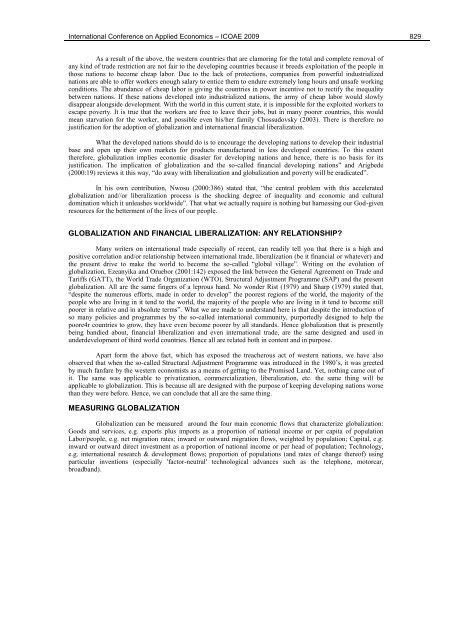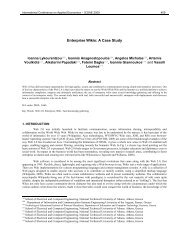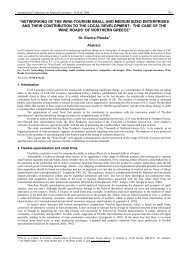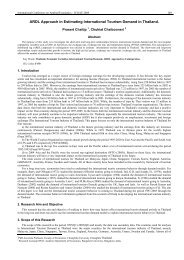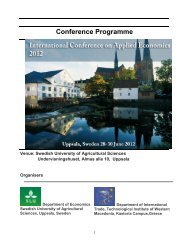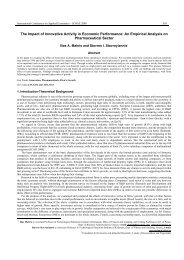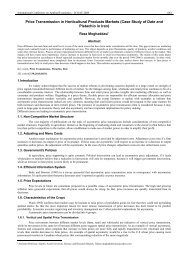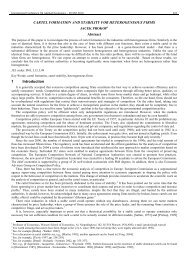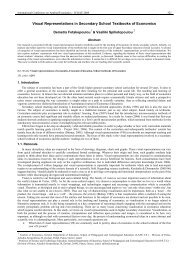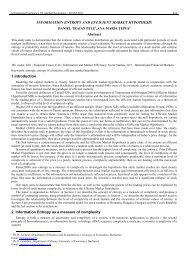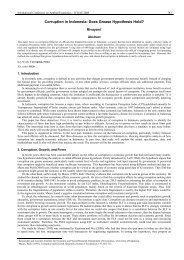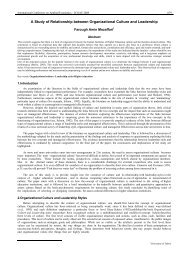Globilisation, Trade and Financal Liberisation: Implication for the ...
Globilisation, Trade and Financal Liberisation: Implication for the ...
Globilisation, Trade and Financal Liberisation: Implication for the ...
Create successful ePaper yourself
Turn your PDF publications into a flip-book with our unique Google optimized e-Paper software.
International Conference on Applied Economics – ICOAE 2009 829<br />
As a result of <strong>the</strong> above, <strong>the</strong> western countries that are clamoring <strong>for</strong> <strong>the</strong> total <strong>and</strong> complete removal of<br />
any kind of trade restriction are not fair to <strong>the</strong> developing countries because it breeds exploitation of <strong>the</strong> people in<br />
those nations to become cheap labor. Due to <strong>the</strong> lack of protections, companies from powerful industrialized<br />
nations are able to offer workers enough salary to entice <strong>the</strong>m to endure extremely long hours <strong>and</strong> unsafe working<br />
conditions. The abundance of cheap labor is giving <strong>the</strong> countries in power incentive not to rectify <strong>the</strong> inequality<br />
between nations. If <strong>the</strong>se nations developed into industrialized nations, <strong>the</strong> army of cheap labor would slowly<br />
disappear alongside development. With <strong>the</strong> world in this current state, it is impossible <strong>for</strong> <strong>the</strong> exploited workers to<br />
escape poverty. It is true that <strong>the</strong> workers are free to leave <strong>the</strong>ir jobs, but in many poorer countries, this would<br />
mean starvation <strong>for</strong> <strong>the</strong> worker, <strong>and</strong> possible even his/her family Chossudovsky (2003). There is <strong>the</strong>re<strong>for</strong>e no<br />
justification <strong>for</strong> <strong>the</strong> adoption of globalization <strong>and</strong> international financial liberalization.<br />
What <strong>the</strong> developed nations should do is to encourage <strong>the</strong> developing nations to develop <strong>the</strong>ir industrial<br />
base <strong>and</strong> open up <strong>the</strong>ir own markets <strong>for</strong> products manufactured in less developed countries. To this extent<br />
<strong>the</strong>re<strong>for</strong>e, globalization implies economic disaster <strong>for</strong> developing nations <strong>and</strong> hence, <strong>the</strong>re is no basis <strong>for</strong> its<br />
justification. The implication of globalization <strong>and</strong> <strong>the</strong> so-called financial developing nations‖ <strong>and</strong> Arigbede<br />
(2000:19) reviews it this way, ―do away with liberalization <strong>and</strong> globalization <strong>and</strong> poverty will be eradicated‖.<br />
In his own contribution, Nwosu (2000:386) stated that, ―<strong>the</strong> central problem with this accelerated<br />
globalization <strong>and</strong>//or liberalization process is <strong>the</strong> shocking degree of inequality <strong>and</strong> economic <strong>and</strong> cultural<br />
domination which it unleashes worldwide‖. That what we actually require is nothing but harnessing our God-given<br />
resources <strong>for</strong> <strong>the</strong> betterment of <strong>the</strong> lives of our people.<br />
GLOBALIZATION AND FINANCIAL LIBERALIZATION: ANY RELATIONSHIP?<br />
Many writers on international trade especially of recent, can readily tell you that <strong>the</strong>re is a high <strong>and</strong><br />
positive correlation <strong>and</strong>/or relationship between international trade, liberalization (be it financial or whatever) <strong>and</strong><br />
<strong>the</strong> present drive to make <strong>the</strong> world to become <strong>the</strong> so-called ―global village‖. Writing on <strong>the</strong> evolution of<br />
globalization, Ezeanyika <strong>and</strong> Oruebor (2001:142) exposed <strong>the</strong> link between <strong>the</strong> General Agreement on <strong>Trade</strong> <strong>and</strong><br />
Tariffs (GATT), <strong>the</strong> World <strong>Trade</strong> Organization (WTO), Structural Adjustment Programme (SAP) <strong>and</strong> <strong>the</strong> present<br />
globalization. All are <strong>the</strong> same fingers of a leprous h<strong>and</strong>. No wonder Rist (1979) <strong>and</strong> Sharp (1979) stated that,<br />
―despite <strong>the</strong> numerous ef<strong>for</strong>ts, made in order to develop‖ <strong>the</strong> poorest regions of <strong>the</strong> world, <strong>the</strong> majority of <strong>the</strong><br />
people who are living in it tend to <strong>the</strong> world, <strong>the</strong> majority of <strong>the</strong> people who are living in it tend to become still<br />
poorer in relative <strong>and</strong> in absolute terms‖. What we are made to underst<strong>and</strong> here is that despite <strong>the</strong> introduction of<br />
so many policies <strong>and</strong> programmes by <strong>the</strong> so-called international community, purportedly designed to help <strong>the</strong><br />
poore4r countries to grow, <strong>the</strong>y have even become poorer by all st<strong>and</strong>ards. Hence globalization that is presently<br />
being b<strong>and</strong>ied about, financial liberalization <strong>and</strong> even international trade, are <strong>the</strong> same designed <strong>and</strong> used in<br />
underdevelopment of third world countries. Hence all are related both in content <strong>and</strong> in purpose.<br />
Apart <strong>for</strong>m <strong>the</strong> above fact, which has exposed <strong>the</strong> treacherous act of western nations, we have also<br />
observed that when <strong>the</strong> so-called Structural Adjustment Programme was introduced in <strong>the</strong> 1980‘s, it was greeted<br />
by much fanfare by <strong>the</strong> western economists as a means of getting to <strong>the</strong> Promised L<strong>and</strong>. Yet, nothing came out of<br />
it. The same was applicable to privatization, commercialization, liberalization, etc. <strong>the</strong> same thing will be<br />
applicable to globalization. This is because all are designed with <strong>the</strong> purpose of keeping developing nations worse<br />
than <strong>the</strong>y were be<strong>for</strong>e. Hence, we can conclude that all are <strong>the</strong> same thing.<br />
MEASURING GLOBALIZATION<br />
Globalization can be measured around <strong>the</strong> four main economic flows that characterize globalization:<br />
Goods <strong>and</strong> services, e.g. exports plus imports as a proportion of national income or per capita of population<br />
Labor/people, e.g. net migration rates; inward or outward migration flows, weighted by population; Capital, e.g.<br />
inward or outward direct investment as a proportion of national income or per head of population; Technology,<br />
e.g. international research & development flows; proportion of populations (<strong>and</strong> rates of change <strong>the</strong>reof) using<br />
particular inventions (especially 'factor-neutral' technological advances such as <strong>the</strong> telephone, motorcar,<br />
broadb<strong>and</strong>).


